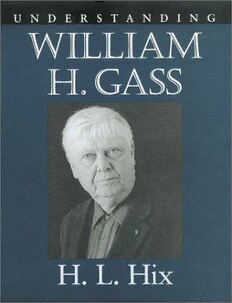
Understanding William H. Gass (Understanding Contemporary American Literature) PDF
204 Pages·2002·0.944 MB·English
Most books are stored in the elastic cloud where traffic is expensive. For this reason, we have a limit on daily download.
Preview Understanding William H. Gass (Understanding Contemporary American Literature)
Description:
William H. Gass writes in his essays about "the world within the word" and "the soul inside the sentence," yet readers often find it difficult to get far enough into Gass's words and sentences to find the world or soul they contain. In this guide to the American writer and philosopher's novels, short stories, novellas, and essays, H. L. Hix clarifies the obscurities that have served to limit access to Gass's corpus and explores how the parallels between his fiction and nonfiction illumine their related themes. Hix offers readings of Gass's works, from the early books, Omensetter's Luck and In the Heart of the Heart of the Country, to his later The Tunnel and Cartesian Sonata. Hix identifies the continuous presence of psychological, metaphysical, and ethical themes, including the lingering effect on adults of childhood hurts, the results of being "trapped" in language, and the consequences of hatred. While agreeing with critics who label Gass's novels and stories metafiction, he contends that to stop the exploration there would be to miss a complete appreciation of the novelist. Hix demonstrates instead how Gass's writings both break and follow tradition--as metafiction belonging to the company of works by John Barth but also as moral fiction belonging in the long American tradition that includes The Scarlet Letter and To Kill a Mockingbird.
See more
The list of books you might like
Most books are stored in the elastic cloud where traffic is expensive. For this reason, we have a limit on daily download.
